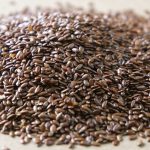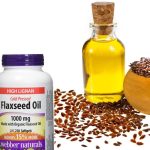7 Flaxseed Benefits For Men

Flaxseed, also known as linseed, is the seed of the flax plant (Linum usitatissimum). It has a rich history that spans thousands of years and has been cultivated for both its fiber and its nutritional properties.
The cultivation of flax and the use of flaxseed date back to ancient times. Flax was first domesticated in the Fertile Crescent region, which includes modern-day Iran and Iraq, around 10,000 years ago. It was one of the earliest cultivated plants and was highly valued for its strong fibers, which were used for making textiles, ropes, and sails.
In addition to its use as a fiber crop, flaxseed was also recognized for its nutritional benefits. The ancient Egyptians, for instance, consumed flaxseed as a food source and used it for medicinal purposes. The Greek physician Hippocrates, often referred to as the “father of medicine,” prescribed flaxseed to his patients for its laxative properties.
Throughout history, flaxseed continued to be highly regarded for its health benefits. In medieval Europe, it was commonly used to treat digestive ailments and promote general well-being. The 8th-century King Charlemagne even passed laws requiring his subjects to consume flaxseed regularly.
Flaxseed’s popularity as a nutritional powerhouse continued into modern times. It gained recognition as a source of omega-3 fatty acids, lignans, and dietary fiber. More recently, flaxseed has experienced a resurgence in popularity due to its numerous health benefits. In this article we will be looking at the health benefits of flaxseed for men.
Flaxseed Benefits For Men
While most health benefits of flaxseeds apply to both men and women, there are some specific advantages that can be particularly beneficial for men. Here are some key health benefits of flaxseeds for men:
1. Heart health: Flaxseeds are rich in omega-3 fatty acids, specifically alpha-linolenic acid (ALA). Omega-3 fatty acids have been shown to support heart health by reducing the risk of heart disease by improving heart rhythm, reducing blood clotting, lowering blood pressure, and decreasing inflammation in the arteries. The soluble fiber content in flaxseeds can also help lower LDL cholesterol (the “bad” cholesterol) levels. Soluble fiber binds to cholesterol in the digestive system, preventing its absorption into the bloodstream. By reducing LDL cholesterol, flaxseeds can help maintain healthy cholesterol levels and reduce the risk of plaque formation in the arteries. Flaxseeds also contain compounds that have been found to have blood pressure-lowering effects. The omega-3 fatty acids and lignans in flaxseeds may contribute to reducing systolic and diastolic blood pressure levels, promoting healthy blood pressure and reducing the risk of hypertension.
2. Prostate health: Flaxseeds are rich in lignans, which are plant compounds with antioxidant properties. Lignans are known to have potential anti-cancer effects and can help reduce the risk of prostate cancer. They may inhibit the growth of prostate cancer cells and interfere with the production of hormones involved in prostate cancer development. Flaxseeds lignans have weak estrogen-like effects. In men, these lignans can help balance hormone levels by binding to estrogen receptors and potentially reducing the conversion of testosterone into more potent forms of estrogen. This hormonal balance may contribute to maintaining prostate health.
BPH is a common condition in older men characterized by an enlarged prostate gland. Flaxseeds’ high fiber content may help alleviate BPH symptoms by promoting regular bowel movements and reducing constipation, which can contribute to prostate discomfort.
3. Digestive health: The high fiber content of flaxseeds promotes healthy digestion and prevents constipation. Flaxseeds are an excellent source of dietary fiber, both soluble and insoluble. The insoluble fiber adds bulk to the stool, promoting regular bowel movements and preventing constipation. The soluble fiber absorbs water, forming a gel-like substance in the digestive system, which can help soften the stool and facilitate its passage through the intestines.
The combination of soluble and insoluble fiber in flaxseeds helps regulate stool consistency. It can add moisture to the stool, preventing it from becoming too dry and hard, which can contribute to constipation. At the same time, the fiber can provide structure and bulk to loose stools, promoting regularity. Flaxseeds’ fiber content can also help improve intestinal motility, or the movement of food through the digestive system. By enhancing the rhythmic contractions of the intestines, flaxseeds can support proper digestion and prevent sluggishness in the bowel.
4. Testosterone balance: Flaxseeds contain lignans that have been shown to have weak estrogen-like effects. While this might sound counterintuitive for men, it can actually help balance hormone levels by binding to estrogen receptors and potentially reducing the conversion of testosterone into more potent forms of estrogen. Flaxseeds has a mild inhibitory effect on the conversion of testosterone into dihydrotestosterone (DHT) and estradiol, which are more potent forms of estrogen. By interfering with this conversion process, flaxseeds may help maintain testosterone levels.
Maintaining healthy testosterone levels in men is essential for various aspects of overall health and well-being. Testosterone plays a crucial role in promoting muscle strength and mass, bone density, red blood cell production, libido, fertility, mood regulation, cognitive function, and energy levels. Adequate testosterone levels support healthy sexual function, promote a sense of vitality, contribute to optimal physical performance, and help maintain mental clarity and emotional well-being. Imbalances or deficiencies in testosterone can lead to symptoms such as reduced muscle mass, decreased libido, fatigue, mood swings, cognitive decline, and an increased risk of osteoporosis.
5. Anti-inflammatory properties: Chronic inflammation is associated with various health conditions, including cardiovascular disease, diabetes, and certain types of cancer. Flaxseeds are an excellent source of alpha-linolenic acid (ALA), an omega-3 fatty acid. Omega-3 fatty acids have been shown to possess anti-inflammatory properties and can help reduce inflammation markers in the body. By incorporating flaxseeds into the diet, men can increase their intake of ALA and potentially help mitigate chronic inflammation.
Flaxseeds are also rich in lignans, which have antioxidant and anti-inflammatory effects. These compounds can help neutralize free radicals and reduce oxidative stress, which is associated with chronic inflammation. By acting as antioxidants, lignans in flaxseeds may help combat inflammation at the cellular level.
6. Weight management: Flaxseeds are low in carbohydrates and high in fiber, healthy fats, and protein. Including flaxseeds in your diet can help you feel fuller for longer, potentially aiding in weight management and reducing the risk of obesity. Flaxseeds are an excellent source of dietary fiber, both soluble and insoluble. The high fiber content of flaxseeds promotes feelings of fullness and satiety, which can help control appetite and prevent overeating. By adding bulk to the diet, flaxseeds can contribute to a sense of satisfaction and potentially reduce overall calorie intake.
Flaxseeds are relatively low in carbohydrates, making them a suitable addition to various diets, including low-carb or ketogenic diets. They provide a nutrient-rich option without significantly impacting carbohydrate intake, which can be beneficial for weight management goals.
7. Blood sugar control: The soluble fiber in flaxseeds forms a gel-like substance when mixed with water, which helps slow down the digestion and absorption of carbohydrates. This, in turn, can lead to a more gradual release of glucose into the bloodstream, preventing spikes in blood sugar levels.
Flaxseeds have a low glycemic index, which means they have a minimal impact on blood sugar levels. Foods with a low glycemic index are digested and absorbed more slowly, resulting in a slower rise in blood sugar levels. Including flaxseeds in meals or snacks can help maintain stable blood sugar levels and promote better glycemic control. Chronic inflammation can contribute to insulin resistance and impaired blood sugar control. Flaxseeds contain lignans and other antioxidants that have anti-inflammatory properties. By reducing inflammation, flaxseeds may help improve insulin sensitivity and support better blood sugar regulation.
How to Incoporate Flaxseed Into Your Diet As A Man
Incorporating flaxseeds into your diet as a man is relatively easy and can be done in various ways. Here are some simple suggestions:
1. Ground flaxseeds: Grinding flaxseeds before consumption enhances their digestibility and nutrient absorption. You can purchase ground flaxseeds or grind them yourself using a coffee grinder or food processor. Store ground flaxseeds in an airtight container in the refrigerator.
2. Smoothies: Add a tablespoon or two of ground flaxseeds to your favorite smoothie recipe. The mild nutty flavor of flaxseeds blends well with fruits, vegetables, and other smoothie ingredients.
3. Yogurt and oatmeal: Sprinkle ground flaxseeds over yogurt, Greek yogurt, or oatmeal for a nutritious and fiber-rich addition. It adds a pleasant crunch and a boost of nutrients.
4. Baking: Incorporate ground flaxseeds into your baking recipes. They can be used as an egg substitute in vegan baking by mixing one tablespoon of ground flaxseeds with three tablespoons of water for each egg. Flaxseeds can also be added to muffins, cookies, bread, and pancakes for added nutritional value.
5. Salads: Sprinkle ground flaxseeds over salads to enhance their texture and nutritional profile. They can be added to green salads, grain salads, or mixed with salad dressings for an extra health boost.
6. Cereals and granola: Mix ground flaxseeds into your favorite breakfast cereals or granola for added fiber and nutrients. It’s an easy way to incorporate flaxseeds into your morning routine.
7. Stir-fries and soups: Sprinkle ground flaxseeds over stir-fried vegetables or add them to soups as a nutrient-rich garnish. It adds a subtle nutty flavor and enhances the nutritional value of your meals.
Remember, it’s recommended to start with a small amount of flaxseeds, such as one to two tablespoons per day, and gradually increase intake as tolerated. This allows your body to adjust to the increased fiber content. Additionally, always consume flaxseeds with sufficient water to aid digestion and prevent any potential gastrointestinal discomfort.
If you have specific dietary restrictions or medical conditions, it’s advisable to consult with a healthcare professional or registered dietitian for personalized advice on incorporating flaxseeds into your diet.





